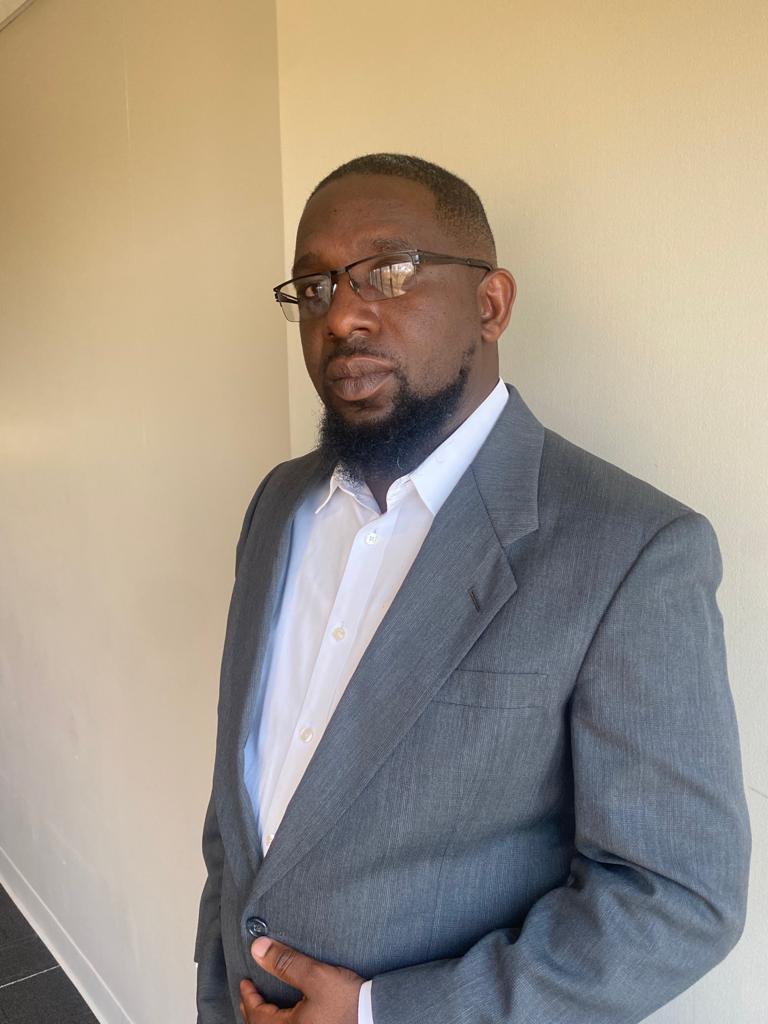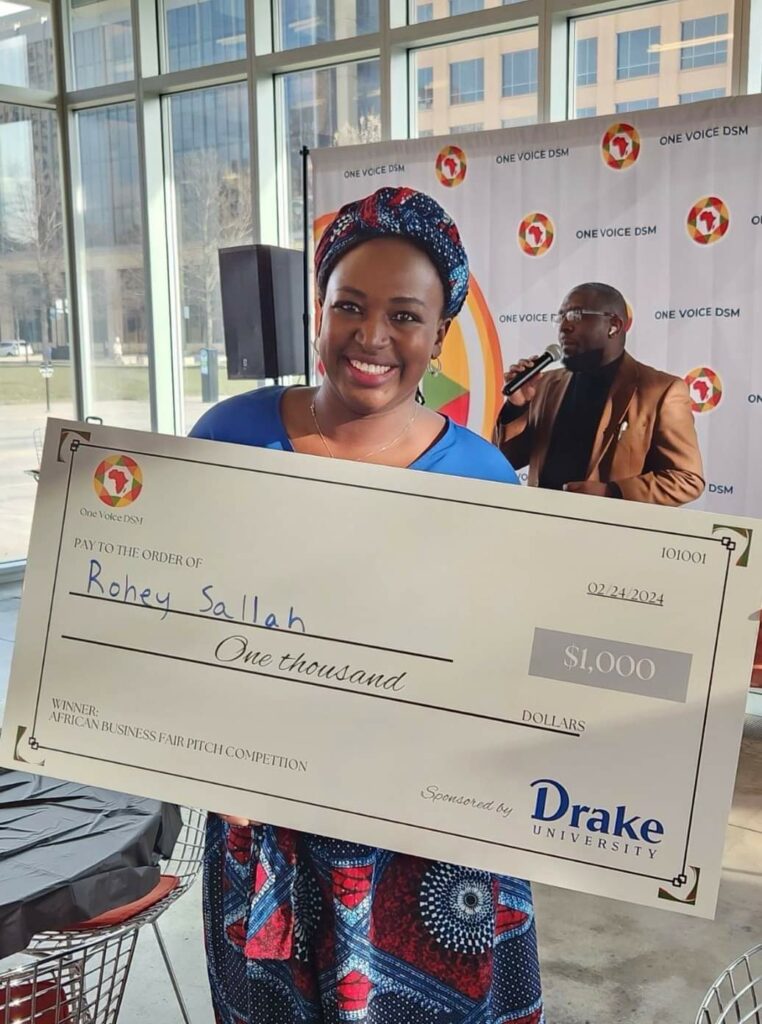Vice President Jack Chimbetete shares about the organization’s third African Business Fair

When Jack Chimbetete first came to Iowa in 2018 as a participant in the Mandela Washington Fellowship for Young African Leaders, the then-newly formed nonprofit One Voice DSM welcomed him and the other fellows with a ceremony and a reminder of home.
“Because we had been at Drake for a couple of weeks, one of the things that you’d be missing is just home-cooked meals, food from home,” Chimbetete said. “I’m OK with the burgers and I’m OK with all the American mac and cheese but sometimes you want a little bit of familiarity, so they welcomed us with some African dishes, which was great, and just the connection of ‘Hey guys, feel comfortable, feel safe. You have a community here.’”
The nonprofit serving anyone with African heritage continues to host the Mandela Washington fellows each year as part of its mission to provide social and professional support to members of the African community, including recent immigrants.
There are monthly meetups, which help community members share professional development opportunities or discuss common experiences like how they spend American holidays when their families aren’t here. One Voice also hosts an African Youth Summit to help mentor and empower youths as well as a year-end gala and celebration.
Chimbetete, who has served as vice president of One Voice since 2022, took a deeper interest in Des Moines after discovering a connection between the missions of One Voice and his budding business idea.
“That got me very excited for the community that really opened up to it, and was willing to support me,” he said.
He opened a U.S. branch for his streaming and networking platform Africalivenetwork.tv in 2019 and runs the business from Iowa. Just as he started plugging into Des Moines’ ecosystem as a business owner then, he now helps other new entrepreneurs make their own connections.

One Voice held its third African Business Fair on Feb. 24 in downtown Des Moines, an event focused on giving African business owners access to information and the local resources to grow their business.
“Our workshops are really designed to inform, educate and empower the participants to strategically be connected to the ecosystem,” Chimbetete said.
One Voice held a pitch competition for the first time this year. Rohey Sallah, pictured, owner of Bah Kunda Kitchen, was awarded the first-place prize of $1,000.
Chimbetete said One Voice hopes to expand the event’s reach statewide in future years. Below, he shares more about One Voice, its support for entrepreneurs and the partnerships it seeks to build in Des Moines.
This Q&A has been lightly edited for clarity and length.
For people who are new to Iowa and entrepreneurship, what does their path to get started look like?
Part of the reason we are there is to facilitate empowerment because some people are just afraid to start ideas because the U.S. is moving so fast, so sometimes people are just afraid of, “Oh my goodness, can I actually leave my job to start a business?” We create that cushion to say, “Look, there’s so many things you can do to start, you don’t have to start by totally letting go of your work. You have a great idea. This is where you can start.” We also help with connecting them with incubator space, the accelerator programs, for example, the Drake Business Accelerator program. We’ve had good success getting a lot of our people realizing that there are opportunities for growth beyond what they have been doing and what they wanted to do, but also [working] toward their dream. Really one of the things that people who come to the U.S. have always been taught about is the American dream, so they really want to learn and make it their own dream. We try to activate that possibility that it is possible to get to that dream, it is possible to envision it, and if you use the right tools, resources, information and bridge that knowledge gap, you can achieve this result.
Are there specific barriers that affect members of the African diaspora as they start businesses in the U.S.?
Yeah, there are particular challenges. One of the main challenges I will tell you I have faced is when you get to a place where your business has a minimum viable product of you’re live, you’re operating, but you need to scale. Part of the thing that you want to do is you want to raise funds, but people in our community will struggle because a lot of people who are based in America have the resources to do a friends and family round, but if you don’t have a lot of friends here, you don’t have a lot of family here, how are you going to be able to start that? And to be able to get into the venture firm and you’re a person of color and you’re a person from another country present from another country? No matter how great your idea is, even if it’s a billion dollar idea, it’s going to be very hard to connect to some resources.
That’s one of the major challenges was access to finance. Also access to backing, again, because you’re an immigrant, you haven’t created a really firm credit score, you haven’t probably accumulated as many assets as people here who probably have generational backing of assets that they can use to give the bank. Some of these things are very essential for business growth. I think if we could have organizations partnering with us as well and say, “Look, we are venture firms, we are banks, we are organizations that want to see the community succeed, especially in this part of the world.”
Another major challenge is just being able to get out there. It’s difficult to make people know about the good things we’re doing, the good products we have, the good innovators and ideas and the projects that are out there that really need a lot of partnership from different perspectives and angles to be refined and to be able to get on the shelf or get a bigger market. These are the main challenges that I see, but the potential, like I said, is so, so great and the energy is great.
What we try to do as an organization is we try to continue pushing people forward with whatever they have, and we have seen that once you keep pushing, the traction that you begin to build and through that traction, eventually you’re able to connect. But we can do better because one of the main reasons I came to Des Moines is I saw the ecosystem being very effective and working well with all of these organizations. … I saw that they have a really functional system; all that needs to happen in the system is to plug in different communities. To say, “Oh, we have a different community. How can we give them the same amount of opportunities that everybody else gets?” Access to information, access to resources and also give them a bit of room for them to expand their ideas because they might not have the same backing that everybody else has. So that’s one of the bridges that we’re trying to create and the conversations we try to continue having.
As One Voice seeks to grow partnerships, what kind of awareness and engagement would the organization like to see from the business community?
I think being able to allow members of our community to also participate. For example, I was at the Book of Lists event and there were probably not too many people of color that I could count. There are lots of events that our community, I wouldn’t say gets excluded, but doesn’t get to be invited because maybe they don’t know how to connect with us, they don’t know who to get ahold of, and part of what we’re trying to do now with the type of thing we’re doing with the business fair, and all these programs is to really say we are also wanting to participate in all the corporate events. There are so many CEO roundtable events, but we’ve never seen people in our community being invited. There are so many conferences that happen, there’s so many professional development opportunities that happen, so the business community could really plug us in, even if initially just through One Voice and then we could filter it out like this is a good industrial programming event that these types of people can go to or this or something that has to do with fashion or has to do with food. There’s so many of these things that happen in Des Moines that are great, and our community has all this talent. All we want to do is really just be, again, strategically connected to what’s going on. That way even though we have all these other businesses that have grown, that are bigger, there are also all these small businesses that also want to grow and want to be part of the community. How can we accommodate them, include them in our planning, include them in our programming and have everybody feel like we are all part of a thriving society.
How do you think One Voice operates and thinks differently as a nonprofit?
One Voice is a nonprofit because what we do is we serve the business owners like myself who are in the organization, and we help facilitate to say what can we do to grow them? Part of our strategy is really to be able to connect with any organization out there that accelerates growth, any organization out there that has funding opportunities, partnering opportunities, any organization out there, at whatever level, that is willing to help contribute to our mission — we want to have a conversation with them. We want to be looking at how can we work together, and that will allow us to really be able to impact a lot more organizations, impact a lot more business owners. Our impact will make sure that these businesses can thrive. We provide them with the right connections, with the right resources and with the right tools for them to be able to survive. We just want to be there to be that facilitator. Whether it’s businesses or nonprofits, we’re there for the whole works, because nonprofits have to operate as businesses if they are to compete, if they have goals. We want to be that plug for our community.